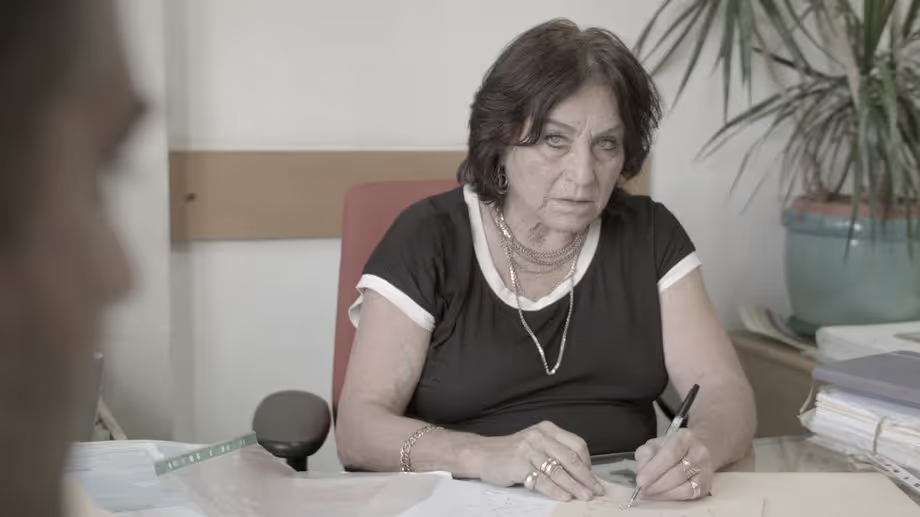Advocate: Discussion Guide Discussion Prompts
Discussion Prompts

PROMPT ONE: STARTING THE CONVERSATION
Immediately after the film, you may want to give people a few quiet moments to reflect on what they have seen. You could pose a general question (examples below) and give people some time to themselves to jot down or think about their answers before opening the discussion. Alternatively, you could ask participants to share their thoughts with a partner before starting a group discussion.
DISCUSSION PROMPT: STEREOTYPING & ANTI-PALESTINIAN, ANTI-MUSLIM RACISM
Throughout the film, we see the media, court officials, and individuals depict Palestinian political prisoners, and Palestinians and Muslims more broadly, as less human than Jewish-Israelis. In her work as an advocate for Palestinian political prisoners, Lea navigates how to make cases for her clients in the midst of pervasive racist stereotypes.
- How are Palestinians portrayed by the Israeli government and media in the film? How does this portrayal compare to representations of Jewish-Israeli society?
- In what ways do various people in the film use racist representations of Palestinians as inherently anti-Semitic and “blood-thirsty” to justify Israeli occupation?
- How do Palestinians and Jewish-Israelis such as Lea Tsemel push back against dominant racist stereotypes about Palestinians?
DISCUSSION PROMPT: CHILD DETENTION
Israel has signed both the Geneva Convention on the Protection of Civilians and the United Nations Convention of the Rights of the Child; however, it remains the only country that tries children in military courts.[26] Further, as a UNICEF report observes, the Israeli military routinely inflicts human rights abuses on Palestinian children under dentention.[27] Since 1967, 45,000 Palestinian children have been held in some form of detention, and each year on average Israel arrests, interrogates, and detains around 700 Palestinian children.[28]
- How is Ahmad described by Israeli media and civil society? How does Israel’s detention of Palestinian minors like Ahmad undermine trust between Palestinians and the Israeli state?
- What does Israel’s policy of detaining Palestinian children, as depicted in the film, reveal about Israel’s criminal justice system?
- Did you learn about laws meant to protect the rights of children and minors that Israel is ignoring? Why does Israel ignore international laws that protect the rights of children and minors from detention, torture, and forced interrogations? How should the international community respond to such violations? For example, should the international community consider placing sanctions on Israel for breaking international law?
- The U.S. government held a record 69,550 migrant children in custody during the fiscal year 2018-2019.[29] In what ways are U.S. practices of child detention similar to Israel’s? How should U.S. citizens respond to these practices of the U.S. state that directly compromise the human rights of thousands of children?
DISCUSSION PROMPT: LIMITS OF LEGAL JUSTICE
Throughout the film, Lea attempts to use the Israeli courts to seek justice for Palestinian prisoners. At the same time, she constantly confronts the limits of the courts in delivering justice to Palestinian defendants.
- Why might Palestinians be skeptical of the Israeli legal system? What are examples of discrimination against Palestinians in the Israeli court system shown throughout the film? What does this suggest about the need to interrogate “justice” and the ideas they are founded upon?
- Lea describes constantly losing cases, with only occasional rulings in her favor, such as the Israeli Supreme Court decision on the use of torture in 1999. Why do you think she continues to fight within the legal system if she rarely wins cases? What does this suggest about ongoing fights for justice?
- Should Leah Tsemel have accepted a plea bargain for Ahmad? What does the dilemma she faces reveal about the law as a means of addressing inequality and systemic power?
DISCUSSION PROMPT: MAINTAINING OCCUPATION
In telling her story about growing up in Israel, Lea describes continually becoming more aware of the power the Israeli state holds over Palestinians’ lives.
- As described and depicted in the film, what methods beyond the courtroom does the Israeli government employ to maintain its power over Palestinians within its 1967 borders, and in the West Bank and Gaza?
- How does the treatment and sentencing of Ahmad--and of political prisoners Lea has represented--reinforce the power dynamics between the Israeli state and Palestinians?
- What role do we see the Israeli media play in legitimizing Jewish-Israeli privilege and maintaining institutional discrimination?
Can you add a follow-up question to this that asks people to interrogate/access the practices relative to violence?
DISCUSSION PROMPT: RESISTING OCCUPATION
The film depicts many forms of resistance to Israeli occupation, both among Palestinians and Jewish-Israelis like Lea and her husband, Michel Warschawski.
- What social movements and histories of protest is Lea Tsemel a part of? How does the state attempt to quiet these voices of dissent? Why do you think these voices are so threatening to the Israeli government?
- How does Lea understand the acts committed by her clients?
- During one interview, Lea says that "Israelis have no right to tell Palestinians how to struggle.” What do you think she means? Do we see this type of relationship - where people with power limit experiences of those with less power and then dictate the ways in which the oppressed are meant to engage in struggle and resistance - in the United States? If so, can you describe where you recognize that type of relationship?
- What ethical responsibilities does the international community have to speak out against the Israeli occupation?
